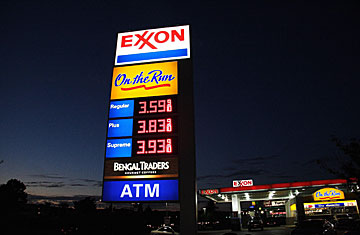
(2 of 4)
Thanks to margin in the futures market, you can trade ten times more oil than you could otherwise afford. For only $9,000, you could control more than $140,000 of oil at recent highs.
All told, about one billion barrels of oil are traded daily through futures contracts at the New York Mercantile Exchange (NYMEX). This volume significantly overshadows the 80 million barrels of oil consumed each day worldwide. Yet this large volume of trading is misleading. Most of the trades are just noise: speculators going for quick profits, taking a position, and closing it out immediately.
A better measure of the size of a futures market is the open interest, the total number of outstanding positions. For contracts ranging from next month to a decade from now, there is a total of one billion barrels accounted for from the total number of outstanding positions. Interestingly enough, more than 30 billion barrels of oil are actually consumed each year. Despite all the volume, the claims realized through open interest pale in comparison to the actual consumption of oil. The futures market is much smaller than the real oil market. When you consider margin, the amount of money actually invested is even smaller. Indeed, one dollar invested in a long-term position in the futures market carries the leveraged weight of more than $300 in the physical oil market.
The point is, it would only take about $9 billion to control the entire long position in oil. That sounds like an enormous amount of money, but some of the major individual players in oil are bigger than the market itself: Sultan Hassanal Bolkiah Muizzaddin, of Brunei Shell Petroleum, is worth about $23 billion; Saudi Prince Alwaleed Bin Talal Alsaud is worth about $21 billion; Russian Vagit Alekperov of LUKoil is worth about $13 billion. No, we're not implicating any of these guys in market rigging; in fact the list of billionaires with that kind of swag is long. The point is that anyone in that category could clearly handle the risks of the oil futures market, and they might even be willing to take delivery on oil. With suppliers holding back their large stakes in oil before delivery, those speculators and hedgers on the other side (those who have sold oil) will need to pay higher prices to get out of their positions. Oil suppliers' ties to the oil market itself give them a unique advantage in cornering the market.
